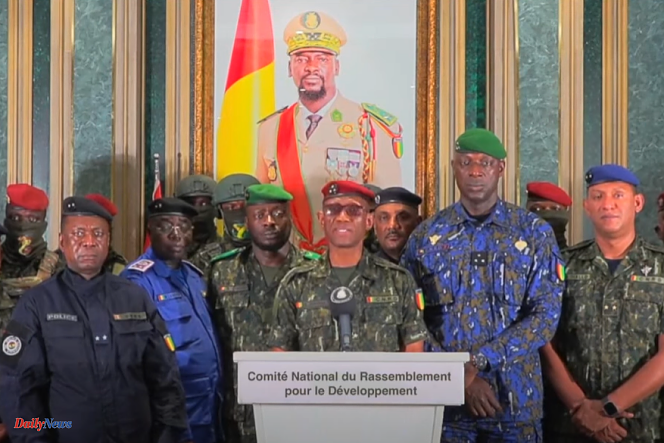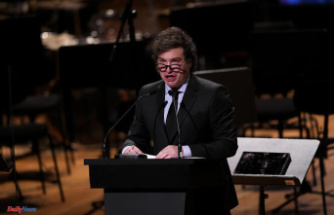The scene had an air of déjà vu, reminiscent of the announcement of the September 5, 2021 coup d’état in Conakry. Monday February 19, Guineans saw around twenty soldiers appear on their television screens, some hooded and helmeted, others in red berets, carrying Kalashnikovs slung over their camouflage fatigues. The posture is martial, the message clear. Behind his desk crossed out with a card indicating that he is speaking from the presidency of the Republic of Guinea and not from a barracks, General Amara Camara, flanked by his chief of staff, Major General Ibrahima Sory Bangoura announces the dissolution of the government led by Bernard Goumou. Without further explanation.
After several days of government cacophony against a backdrop of social crisis, the staging underlines that Mamadi Doumbouya's junta, united within the National Committee of the Rally for Development (CNRD) since the coup d'état against President Alpha Condé, holds the bar firmly. The military are undoubtedly keen to point out that the time has still not come to challenge their self-proclaimed authority.
In a second blow addressed a little later in the evening, the junta announced the freezing of bank accounts and the seizure of passports of members of the dissolved government, ordered to return their official vehicles. “The management of current affairs will be ensured by the directors of cabinets, the secretaries general and the deputy secretaries general until the establishment of a new government,” specifies General Amara Camara.
Threat of general strike
After that ? “A new team should be appointed very quickly,” hopes an outgoing minister, speaking on condition of anonymity. “And why not hope for a gesture of openness towards civil society or appointments which would take more into account the question, very sensitive in Guinea, of community balances? », Adds our source, reached by telephone. Now is the time for guesswork. “Nothing says that the CNRD will not take advantage of this to strengthen the presence of the military in the future government,” worries a historic civil society activist, who also prefers to remain silent. “We can be stopped for a yes or a no,” he explains.
Using understatement, the ex-minister concedes that “the social parameters are not very good”. Guinea has been facing a shortage of hydrocarbons since the colossal explosion, in mid-December in Conakry, of the main national fuel stock. The current dry season would, however, imply an increased use of thermal power plants to produce electricity, and therefore an ardent need for the oil that has gone up in smoke. Not to mention inflation. Prices of rice and flour are increasing. Like that of raw materials on the world market.
Faced with these difficulties, thirteen trade union centers are threatening an unlimited general strike to protest against the deterioration of living conditions and for the release of the secretary general of the Union of Press Professionals of Guinea (SPPG), Sékou Jamal Pendessa, placed under arrest warrant since January 22. The journalist is currently on trial for “undermining and threatening to undermine public order, public security, the integrity and dignity of individuals through a computer system.” He called for demonstrations in mid-January against “airwave jamming and Internet restriction”.
Guineans have no illusions about the future government's chances of extracting them from poverty. The latest Human Development Index (HDI) established at the end of 2021 by the United Nations places their country at the bottom of the world ranking: 182nd out of 191.
An “uncontrollable” Minister of Justice
But it is not for this lack of performance that Prime Minister Bernard Goumou, in office since July 2022, was thanked. The reason would be more prosaic. “A stupid quarrel of power and ego”, according to the civil society activist, between the head of government and the fiery – “uncontrollable”, some say – Keeper of the Seals, Alphonse Charles Wright.
The latter had decided and announced first in the media, on February 12, without referring to the head of government, the opening of investigations into the management of all heads of financial affairs divisions of the central administration, of all the general directors of public establishments as well as mayors. So many injunctions accompanied by prohibitions on leaving the territory.
These initiatives gave rise to an exchange of inflammatory letters between the Minister of State and his “boss”. The first invoking the separation of powers and the independence of justice, the other denouncing a unilateral initiative without informing him, while the role of any head of government is to “ensure the proper functioning of public services” and avoid “abuse of authority”. At the very top of the pyramid, “Mamadi Doumbouya had to decide straight away or risk weakening his authority, as soon as the dispute became public,” explains the former minister. Especially since other ministries also had deleterious relations with the Prime Minister. »
The composition of the next government will provide some answers on the direction the junta intends to take. But this will probably not allow us to know whether it will respect its commitment to return power to civilians at the end of the year.












